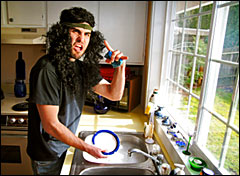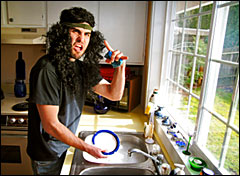Dear Umbra,
Like a good guilt-ridden liberal, I’ve switched to supposed earth-friendly dish detergent. And, on the basis of previous Ask Umbra columns, I don’t rinse my dirty dishes before putting them in the dishwasher. Here’s the thing: About 10 percent of items are still dirty when the dishwasher pronounces things clean. So then I rewash these items, either by hand or (perhaps futilely) in the dishwasher. Doesn’t seem terribly eco-friendly.
Scott D.
South Portland, Maine.
Dearest Scott,
No one said being an environmentalist would be a tiptoe through the tulips. There are going to be setbacks, struggles, moments when we think, “I can’t go on!” But somehow we must raise our weary heads and find the strength to continue. Too often we find daily defeat in the questions inherent in dish duty: by hand or by machine? Does rinsing the plastic bag use too much water? Why does this detergent suck? No amount of dishwashing discussion quite rids us of the nagging, dried-on questions. Today I offer holiday dishwashing succor for the dish distressed.

Don’t bang your head over dishwashing conundrums.
There are three things to consider when washing dishes: water use, energy use, and toxics. If you establish and generally follow some best practices, you can call it good and stop fretting.
There are two good ways to wash the dishes. The first is via full loads of an Energy Star, aka water-and-energy saving, dishwasher. The other is using a bucket or a stopped-up sink, with minimal water usage and an aerated faucet. Dishwashers have been proven, again and again, to be more efficient than the typical hand-washer. Some of you will never believe this to be the case, and youse should go ahead and continue your water-wise habits. (By the way, if you choose to wash and reuse plastic bags, do it in the bucket of water, and then rinse with hot running water. I am not going to research the “is it worse to waste water washing bags or to manufacture more bags” question, because life is too short and other issues are more interesting and/or dire — but if a dearest reader wishes to do the research, I will consider publishing the results.)
Automatic dishwashing detergents may contain any of the following environmentally harmful ingredients: phosphates, ammonia, fragrances, bleach, and petroleum-based surfactants. Buying and using less-toxic detergents is worth it and pretty much obligatory. Unfortunately, they do have performance problems when compared to their traditional cousins. I have very hard water, which they don’t manage well, and Scott has his dried-on food. What to do?
Scott, my suggestions may be irritatingly simpleminded. You must keep using the better detergents, for the health of your family and other carbon-based life forms. Maybe experiment with a few brands. Consumer Reports likes Biokleen, Ecover, and Seventh Generation, in that order; Grist has yet to weigh in but will do so in 2009, so keep an eye out. Whichever you choose, you will need to do some conservative pre-washing. Pre-rinse your dishes in one of two ways: Either keep a rubber spatula at the sink and squeegee off each dish, or keep a little bowl of water handy and sponge off each dish.
Also, consider whether your dishwasher may be over-full. The soapy water must have access to all surfaces, which can’t happen when bowls are piled up against each other, etc. If you continue having the problem after following all this amazing advice, go ahead and rewash the offenders in your sink bucket.
Here concludes my brief return to the world of the dish. May all your holiday dishwashing be in the company of loved ones.
Affectionately,
Umbra



